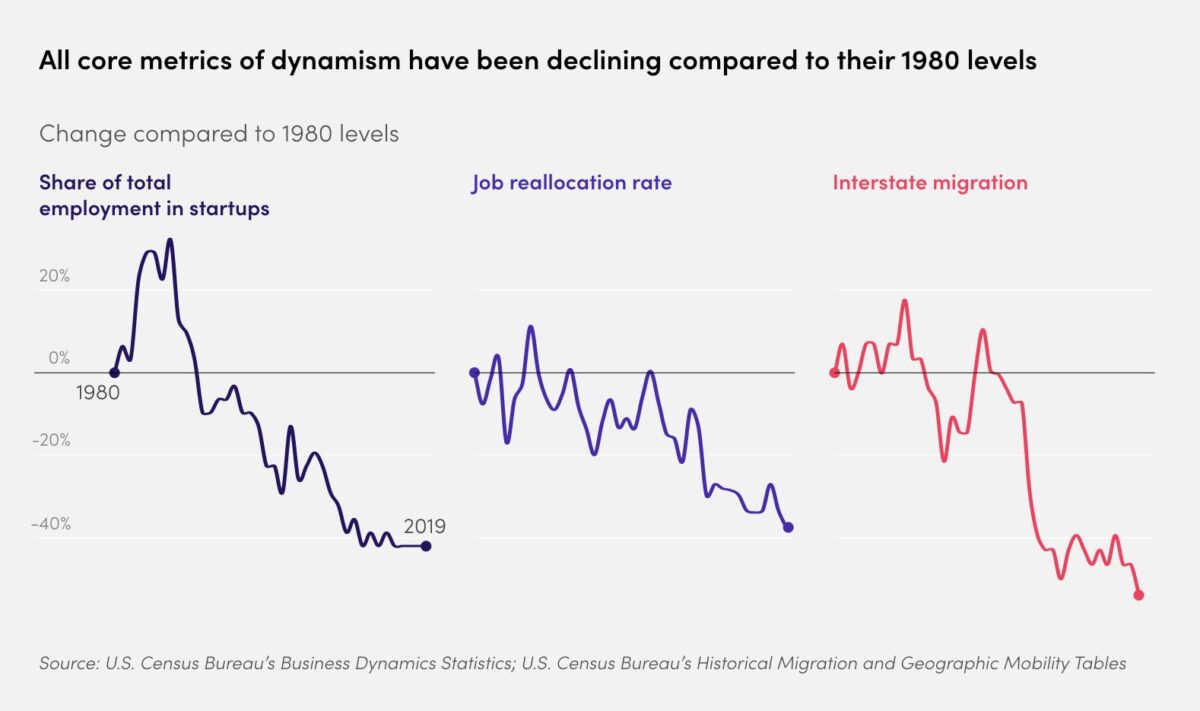What is economic dynamism?
The Economic Innovation Group (EIG), a bipartisan public policy organization, describes it as “the rate and pervasiveness of change across industries, geographies, and the labor market in an economy.”
Contrary to common belief, the 21st century has not been an unprecedented time of economic change. In fact, we’ve been living through a time of resistance to change — and, in some cases, attempted reversal of it.
For example, from 1980 to 2019, the rates of Americans employed by startups, job reallocation and interstate migration have fallen dramatically — over 40% in each case.

Then came the pandemic in 2020, forcing businesses, people and whole economies to change: More people started their own businesses, migration increased and the workplace became more flexible as remote and hybrid options became normalized.
Where does Delaware fit into all of this? The EIG has a dashboard for that, where you can look up individual states and see how they’re doing when it comes to economic dynamism.It starts with the Index of State Dynamism (ISD), which measures eight elements of economic dynamism:
- Core startup rate
- Share of workers at firms less than five years old
- Growth in total firms
- Inventors per 1,000 residents
- Housing permits per 1,000 residents
- Worker churn (how many people move in and out of the workforce)
- Labor force participation rate
- Migration rate

Delaware’s ISD, based on 2021 data, is 49.5 — the third highest in the US, after Utah (which had the highest ISD at 56) and Idaho (the second highest at 49.9).
According to the data, Delaware has the highest rates of jobs in young firms and worker churn in the US. However, it’s ranked only 34th in labor force participation, or the percentage of the population that has a job.
The state’s ranking in the other five areas are:
- 5th in migration
- 6th in firm change
- 11th in core startup rate
- 11th in housing permits per capita
- 27th in inventors per capita
Inventors per capita, which the ISD deems one of Delaware’s current pain points, is an area where the state used to have much higher numbers than average; on the line graph, you can see a sharp dip around the time of the Dow-DuPont merger in 2017. That combination was severed less than two years later in 2019, with the new DuPont de Nemours emerging. Delaware is still recovering in that area, but innovation companies like Incyte, Agilent, Versogen, CorriXR and DuPont spinoff Chemours are thriving and growing. This shows promise that these numbers will rise again.
The migration rate, measured at 1.38%, is also rising as we see a surge of housing development in Middletown, as well as Kent and Sussex counties. Delaware as a whole has a cost of living just slightly higher than the US average, and these rural/small-town lower Delaware areas are generally less expensive. Cost of living seems to factor into in migration: The state with the highest migration rate is Alabama, where the cost of living is 16% than the US average. Nearby Arkansas had the fourth-highest rate, as well as a 14.7%-lower-than-average cost of living. Other high migration states include outdoorsy states like Alaska and Arizona, California and New York City-adjacent Connecticut.
With a low labor force participation rate, the state will need to continue supporting workforce development initiatives, including coding bootcamps, apprenticeship programs, youth workforce cultivation and reentry employment programs.
So, the answer to the question “How dynamic is Delaware?” is: Pretty damn dynamic, especially in comparison to other states — but there are areas that could be more dynamic. As we head into 2024, these are some things to keep in mind.







